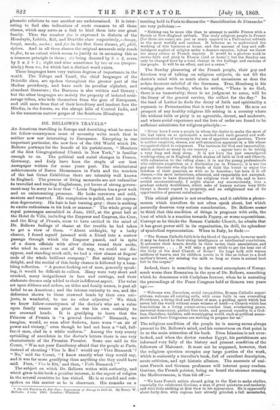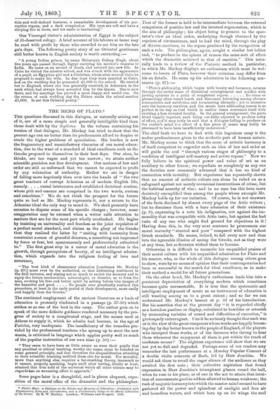DR. BELLOWS'S TRAVELS.*
AN American travelling in Europe and describing what he sees to his fellow-countrymen must of necessity write much that is neither new nor interesting to Europeans. Excepting in one important particular, the new face of the Old World which Dr. Bellows portrays for the benefit of his parishioners, "Members of the first Congregational Church in New York," is familiar -enough to us. The political and social changes in France, Germany, and Italy have been the staple of our best newspaper writers for some years past. The architectural achievements of Baron Haussmann in Paris and the wonders of the last Great Exhibition there are tolerably well known in England. The persons of living monarchs are not unfamiliar to travelled and reading Englishmen, yet lovers of strong govern- ment may be sorry to hear that "Louis Napoleon has a poor walk and an uninteresting presence. He looks careworn and cold, anxious and reserved. His complexion is pallid, and his expres- sion deprecatory. His hair is fast turning grey ; there is nothing to excite enthusiasm in his look or manner." The whole group of royal personages assembled in June, 1867, at the great ball at the Hotel de Ville, including the Emperor and Empress, the Czar, .and the King of .Prussia, seem to have excited in the mind of ])r. Bellows feelings of shame at the trouble he had taken to get a view of them. "About midnight, by a lucky chance, I found myself jammed with a friend into a narrow passage through which the Emperor passed, and in spite of a dozen officials with silver chains round their necks, who tried to crowd us out of the way, we could not dis- appear, and standing stock still, we had a view almost at fingers' ends of the whole brilliant company." But satiety brings no delight, and the recital of this lucky chance is followed by a hum- bling reflection. "A poorer-looking set of men, generally speak- ing, it would be difficult to collect. Many were very short and crooked, many insignificant in face and carriage, and their elaborate dresses only added to their indifferent aspect. The value set upon ribbons and orders, on titles and family names, is past all belief to an American ; and the intense curiosity to see, and the deference shown to these crowned heads by their own sub- jects, is wonderful, to use no other adjective." We think we know fellow-countrymen of the doctor's who set a value upon family names as great as was his own curiosity to see crowned heads. It is gratifying to learn that the Princess of Prussia is "a general favourite." Bismarck, we imagine, would, so soon after Sadowa, have worn "an air of power and victory," even though he had not been a "tall, f nil- faced man, clad in a white uniform." Among the very scanty sprinkling of anecdotes in the doctor's letters there is one very characteristic of the Prussian Premier. Some one said to the Count, "Was not your Excellency afraid that the people at Paris, instead of shouting ' Vive le Roi r would cry ' Vive Bismarck ' ? -" No," said the Count, "I knew exactly what they would say, and it was far more gratifying than anything else they could have said. First, ' Vice le Roi,' and then, ' Volk Bismarck !' "
The subject on which Dr. Bellows writes with authority, and which gives to his book a peculiar interest, is the aspect of religion in the several countries he has visited. He is as candid and out- spoken on this matter as he is observant. His remarks on a
• The Old World in its New Face: Impressions of Europe in 1867-68. By Henry W. _Bellows. 2 vols. 1869. London: Whitfield.
meeting held in Paris to discuss the "Sanctification de Dimanche " are very judicious :—
" Nothing can be more idle than to attempt to saddle France with a Scotch or New-England sabbath. The truly religious people in France (for there are some) are just as much opposed to a Puritanical sabbath as the most worldly and careless. It behoves us to understand the working of this business at home, and the amount of lazy and self- indulgent neglect of religion under a demure exterior, before we throw too many stones at French impiety. It would be a glorious work to revive faith and piety in France (and at home !) but the Sunday can only be changed here by a total change in the feelings and customs of the people. It will be an effect, and not a cause."
The Sunday pleasuring of the French people, their gay and frivolous way of talking on religious subjects, do not fill the doctor's mind with so much alarm and uneasiness as does the sedate decorous unbelief of the Germans. True, Homburg is his resting-place one Sunday, when he writes, "There is no God, there is no immortality, there is no judgment to come, will be the litany of the general service, the collect for the day." In the land of Luther he finds the decay of faith and spirituality a reproach to Protestantism that is very hard to bear. He sees no prospect of any healthy religious life arising in a country where life without faith or piety is so agreeable, decent, and moderate, and where social experience and the love of order are found to be sufficient substitutes for religious principle:— " Never have I seen a people in whom the desire to make the most of life had taken on so systematic a method and such general and well- understood rules of economy in the use of appetites and passions. There is neither suspicion, shame, nor self-accusation apparent in a life whose recognized object is enjoyment. The instincts for God and immortality, which animate so many in our country . . . . appear hero to be taking a very long and deep sleep. It is not here the just emancipated working-class, as in England, which shakes off faith in God and Church, with submission to the ruling class ; it is not the young professionals who cultivate scepticism as a distinction (as in France); it is not the gay and dissolute who slip the bonds of faith the better to enjoy the freedom of their passions, as with us in America ; but here it is all classes,—the most industrious, educated, and respectable not excepted, —who seem to have discarded the religious view of life, and to have settled unostentatiously, I might almost say unconsciously, into a prudent orderly worldliness, which asks of human nature very little except a decent regard to propriety, and an enlightened use of its opportunities of present satisfaction."
This ethical picture is not overdrawn, and it exhibits a pheno- menon which travellers do not often speak about, but which assuredly deserves very serious consideration. Dr. Bellows seems to think that this condition of things is pregnant with evils, the least of which is a reaction towards Popery, or worse superstitions. Corrupt as he thinks the Roman Catholic Church, he admits that it has great power still in its organization, its drill, its splendour of symbolical representation. When in Italy, he finds:—
" The Roman Catholic faith is in the blood of the people, however much it may be denied by their rising intelligence or intellectual convictions. It animates their hearts, dwells in their tastes, their associations, and
their passions It will take a great while to get the heat out of the body of the dead Church of Rome ! Its huge bulk still warms millions of hearts, and its children nestle to it like an infant to a dead mother's breast, not missing the milk so long as there is animal heat left in the corpse."
Indeed, there is something in the moral atmosphere of Europe much worse than Romanism in the eyes of Dr. Bellows, something which he denounces with Carlylean fervour, when he is narrating the proceedings of the Peace Congress held at Geneva two years ago :—
" Welcome war, Csasarism, social inequalities, Roman Catholic super: stitions, welcome all existing evils, with some faith in one overruling Providence, a living God and Father of men, a guiding spirit which has never left the world without some witness of itself—a Church which has foundations in a living corner-stone—rather than everlasting peace, universal democracy, perfect free trade, and general equality in a God- less, Christless, faithless, self-worshipping world, such as political econo- mists and Peace Congresses are striving to prepare for us."
The religious condition of the people he is among seems always present to Dr. Bellows's mind, and his earnestness on that point is to us the main attraction of his book. Even Islamism is not over- looked, and when the doctor reaches Egypt, his parishioners are informed very fully of the history and present condition of the followers of Mahomet. It must not be supposed, however, that the religious question occupies any large portion of the work, which is eminently a traveller's book, full of excellent description, acute criticism, and apt historic allusion. The accounts of emi- nent French and German professors will interest many readers. Grer6me, the French painter, being on board the steamer crossing the Mediterranean, is thus hit off :— " We have French artists aboard going to the East to make studies, especially the celebrated Gerorne, a man of great quietness and modesty, and with little striking at first view in his appearance. He is apparently about forty-five, with copious hair already grizzled, a full moustache,
thin and well-defined features, a remarkable development of his per- ceptive organs, and a dark complexion. His eyes are soft and have a sleeping fire in them, and his smile is fascinating."
Our Viceregal visitor's administration of Egypt is the subject of ill-deserved eulogy. A brief account of his labours at home may be read with profit by those who crowded to see him on the late gala days. The following pretty story of an Oriental gentleman still better known in English society is worth extracting :—
" A young Indian prince, by name Maharajah Duleep Singh, about five years ago passed through Egypt carrying his mother's remains to India. He came on an errand of death, and entered into new life. In Cairo he visited the mission school, and was struck with the appearance of a pupil, an Egyptian girl and a Christian, whom after several visits he proposed to make his wife. In due time they were married at Cairo, and on the wedding day he presented £1,000 to the school. He carried her to England, where she was generally received, in deference to the rank which had always been accorded him by the Queen. She is now there, and the marriage has proved a most happy and useful one. On the return of each wedding day the Prince sends the school another 41,000. Is not this Oriental poetry."































 Previous page
Previous page